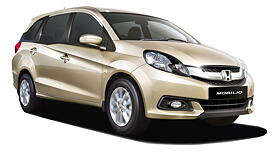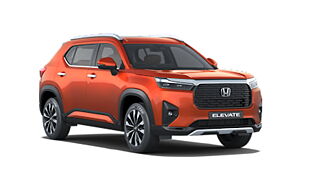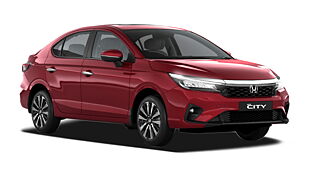Introduction

It may sound amusing to many who know me, but I was really excited about the prospects of reviewing the Mobilio. To most around me it is a people carrier – of course a very important one, but still an MPV that is built to choose practicality over almost everything that makes motoring fun. This one, however, is special; it carries a big ‘H’ at the front and that puts it in a different league not just for me but for many others in the Indian market, because Honda has always enjoyed a very special place here. Even when they didn’t have a diesel engine and innovative products, Honda managed to hold on to its aspirational value like no other brand in the mass market. The Amaze and the new City have enjoyed success and Honda will now enter a new segment with a product that may set new benchmarks for mid-sized vehicles.
Looks and Styling

The appearance of the Mobilio is interesting. Frankly, I have never been a big fan of the Brio and Amaze's design, so I find it a little comical to see the same on a much bigger car. The bulbous headlamps and smiling chrome grille create a contrast with the aggressive, edgy front bumper, and the overall effect is that the Mobilio looks unsure whether to greet you with a smile or a frown.
The view from front three quarters tells a different story though – the focus shifts from the face to the overall proportions and the Mobilio does well to pass off as a proper seven-seater. A lot of effort has gone into making this car look premium. The wheel arches although not bulging are well defined, all except the front pillars are blacked out to create sort of a floating roof and the arc on the middle window-line is a very interesting touch. The overall design is busy with three bold creases running on the side of the car and the big tail lamp encroaching on the side profile.

The lamps at the back are like a smaller version of the ones on the new Honda City. The overall design of the tail section is probably the best among the MPVs – I especially like the black elements at the bottom and on the rear windshield that create a border and hide the visual bulk at the back.

At around 4.4 metres the Mobilio is longer than the Maruti Suzuki Ertiga and Chevrolet Enjoy, but smaller than the Mahindra Xylo and Toyota Innova. And it looks the size, it is evidently bigger than the Ertiga and anyone who sees this will have no doubt that it is made to seat seven people

Also, while I may continue to rant about the facial expressions of the Mobilio, I am sure that at least a couple of my team mates will strongly defend the design when we get it to the office for a longer period. The thing about this Honda design is that it is controversial – you will either like it or you won’t, but in either case it will get attention and that is good enough.
Interior and features

As expected the interiors are similar to that of the Brio and the Amaze, with additional features from the City. The dual-tone dashboard gets glossy faux wood inserts and the conventional music system from the small cars has been replaced with the touchscreen unit from the Honda City.
The typical beige interiors of Honda makes the MPV look roomy, not that it is any different in reality, but Honda has had to put in a lot of effort to achieve this space. The thing is, at 2652mm the wheelbase of the Mobilio is less than that of the Ertiga and the space management needed that extra bit of attention. The thickness of the seats is reduced and the front-seat back is scooped out to create additional room for the middle row passengers. The middle row then has to have a slide-and-tumble function for easy entry and exit to the third row and also to provide a little extra space when required.

The front seats are comfortable, but the headrests are not adjustable and that is looked down upon in India. The middle row gets a 60:40 split and has a basic centre armrest that provides for comfortable seating, although nowhere close to that of bucket seats. The third row can be used by adults for short rides provided the middle row passengers are willing to forgo their knee room. However the posture is not going to be comfortable with the knees up, due to the floor being too close to the seat base.

The instrument cluster, although similar to that of the Amaze again, gets nice blue backlighting that feels very classy and the information available there is pretty exhaustive. There are 11 cup and bottle holders in the car and it is evident that the comfort of the rear passengers is well thought over. The vents at the back don’t just blow cold air through ducts but have an independent condenser that considerably improves the cooling. The mid-spec variants will get a two-DIN audio system, while the top-end gets an AVN (audio/visual /navigation) pack – meaning a touchscreen with satnav - from the City. Like most Hondas, this one isn’t feature-rich and buyers now used to climate control, button start function and keyless entry are sure to complain.

With all three rows in place, the Mobilio offers enough space for two medium sized suitcases in the boot. Both the third and the second row can be folded to provide for additional space. However neither of them fold flat unlike the Ertiga’s third row, so it does not create massive space for oversized cargo, but two independent compartments for bags.

The overall feel of the Mobilio interiors is acceptable and the features list is also decent – the most important thing though is that Honda claims it offers more space than a couple of bigger MUVs. At the moment I can’t find a reason to challenge that, but will certainly verify it when we get the car for a comprehensive review.
Engine and performance

The petrol engine is the 1.5-litre version of the i-VTEC with an output of 116bhp and 145Nm. Start the engine and you will immediately appreciate the refinement, this is undoubtedly the best engine in the segment. It is mated to the standard five-speed manual gearbox that feels very positive with a short throw. The engine makes sufficient power and also sounds delightful at high rpm. The power however is high up the band and downshift is necessary to execute a quick overtaking manoeuvre. This is a contrast to the Ertiga’s petrol, that focuses on low-end torque rather than high-rev fun. Honda claims class leading ARAI efficiency figures of 17.3kpl for the petrol Mobilio.

The 1.5-litre EarthDreams i-DTEC powers the diesel versions, with the five-speed transmission from the Amaze. I would have loved to see the six-speed from the City on this car, but Honda has probably omitted it due to cost constraints. This MPV is heavier than the Amaze and the technicians have shortened the gear ratios and changed the ECU mapping to optimise performance. It produces 100bhp and 200Nm of torque – the numbers may seem meagre for its size, but the torque spread is so good that there is no reason to complain. Of course, we are yet to drive a fully loaded car, which might change our perception, especially of the petrol.
The driveability of the diesel Mobilio is much better than the petrol – the flat torque curve makes it really easy to drive in any situation. The only sore point is the refinement, the engine is still a bit harsh and that is something that the buyers will have to live with.
Ride and Handling

The ride is comfortable, the suspension setup is on the softer side (especially on the diesel) and that works in favour of passengers on the Indian roads. It rides on 185/65 R15 tyres and ground clearance is 189mm, so going through most potholes and over speed bumps is very easy. There is some tyre noise beyond 100kph and that along with engine noise of the diesel severely affects the NVH levels of the car.
There is a decent amount of body roll due to the high centre of gravity and soft suspension. The Mobilio is not a vehicle that you would want to go screaming around corners with; it will do a much better job at sedate speeds with six passengers. The steering is light and feedback is minimal though it does weigh up decently at high speeds.
Verdict

As an overall package, the Mobilio is a very strong product. It looks and feels premium, despite being relatively small in size there is ample space for seven and the engine options are better than its direct rival, the Maruti Suzuki Ertiga.
The Mobilio is bigger than the Ertiga from every perspective, but it will be competitively priced because of its component sharing with the Amaze and City. However, this is not one of those cars that will need to depend entirely upon pricing as a USP. The Mobilio will enter with a price that will put it in competition with premium hatchbacks, compact sedans, entry-level crossovers and even the mid variants of C-Segment sedans. The Mobilio has an advantage over many of these models in space, efficiency and brand value – but those aren’t the only reasons it will be successful. Despite being an overtly practical car, it somehow manages to be desirable, and that means that the big H can safely assume that its aspirational value will surprisingly remain intact with this, its most practical car.

























